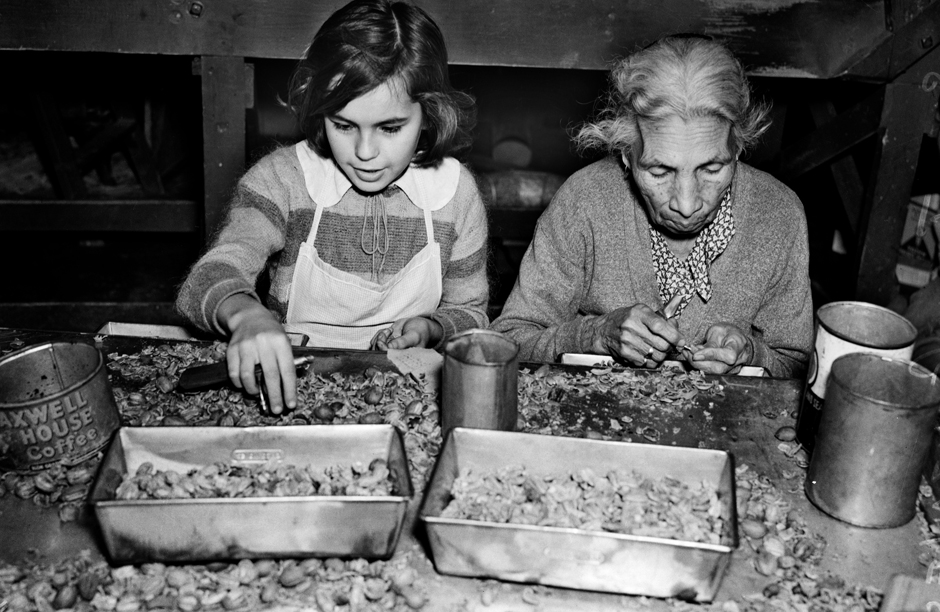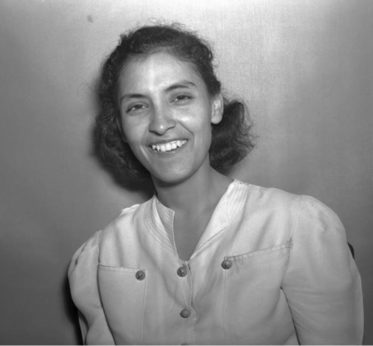
Eighty years ago, on January 31, 1938, 12,000 San Antonio pecan shellers, mostly Mexican-American women, walked off their jobs. A three-month strike followed, in which the pecan shellers confronted both management and San Antonio politics.
In the 1930s Texas pecans accounted for approximately 50 percent of the nation’s production. San Antonio was the Texas shelling center because half the commercial Texas pecans grew within a 250-mile radius of the city. The pecan-shelling industry was one of the lowest-paid industries in the United States, with a typical wage ranging between two and three dollars a week.
In the nearly 400 shelling factories in San Antonio, the contracting system was prevalent; the large firms controlled the supply of nuts as well as the prices for shelling. Working conditions were abysmal: Illumination was poor, inside toilets and washbowls were nonexistent, and ventilation was inadequate. Fine brown dust from the pecans permeated the air, and the high tuberculosis rate of San Antonio—148 deaths for each 100,000 persons, compared to the national average of 54—was blamed at least partially on the dust. Women constituted 50 percent of the work force.
The Southern Pecan Shelling Company, owned by Julius Seligmann, shelled one-fourth to one-third of the nation’s entire crop and dominated the San Antonio market. The company had begun in San Antonio in 1926. Before that year machines had cracked and graded the nuts; the separation of the meats from the shells was the only operation performed by hand. The Southern Pecan Shelling Company replaced all machines with hand shelling, cracking, and shaking. The labor union representing the pecan shellers was the International Pecan Shellers Union No. 172, a chapter of United Cannery, Agricultural, Packing, and Allied Workers of America, which belonged to the newly formed Congress of Industrial Organizations (CIO).

The original strike leader was Emma Tenayuca, born in 1916, a well-known figure in San Antonio politics and the dominant force in the Workers Alliance, a national organization formed by the Communist Party during the Great Depression. In the Mexican-American community, she was known as “La Pasionaria,” recognizing the Spanish Civil War Republican heroine Dolores Ibárruri.
Tenayuca, whose husband, Homer Brooks, was a former Communist Party gubernatorial candidate, had led sit-downs at City Hall and battled pay cuts in the Work Projects Administration. She was an articulate leader who offered her help for the strike. On February 7, Donald Henderson, president of the United Cannery union, arrived to direct the strike. He soon passed this responsibility to CIO organizer J. Austin Beasley and withdrew from formal leadership of the strike, while continuing to play a major role in the day-to-day activities.
The strike began because of a pay cut. The wages of shellers who had earned six or seven cents a pound (six cents for pieces, seven cents for halves) were reduced to five and six cents a pound. Wages for crackers were cut from fifty cents to forty cents for each 100 pounds. San Antonio officials strongly opposed the strike. More than 700 arrests were made. Owen Kilday, chief of police, stated under oath that the strike was part of a “Red plot” to gain control of the West Side of San Antonio.
George Phillip Lambert, an activist in the strike, claimed that the political leaders feared the Mexican Americans would become aware of their own power. Picketing of the 400 factories was complicated by police actions. Kilday claimed that there was no strike and dispersed demonstrators and arrested picketers. In one week in February, 90 male pecan shellers were arrested and imprisoned with 200 other prisoners in a county facility designed to hold 60. The strike received national and international attention because of the mass arrests. At Governor James Allred’s urging, the Texas Industrial Commission investigated possible violations of civil rights in San Antonio and found the police interference with the right of peaceful assembly to be unjustified.
In March 193,8 both sides agreed to arbitration. An initial settlement of seven and eight cents was increased when Congress passed the Fair Labor Standards Act of 1938, which established a minimum wage of twenty-five cents an hour. Concerned that the minimum-wage law would encourage re-mechanization of the industry in Texas and thereby displace thousands of shellers, the CIO joined with the employers’ association in seeking an exemption of pecan workers from provisions of the Fair Labor Standards Act. The Department of Labor, however, denied the exemption, and over the next three years cracking machines replaced more than 10,000 shellers in San Antonio shops.
Adapted from Richard Croxdale, Texas State Historical Association. See full story here. The American Postal Workers Union also discusses this strike here. A video of Emma Tenayuca speaking about the strike can be viewed here.










